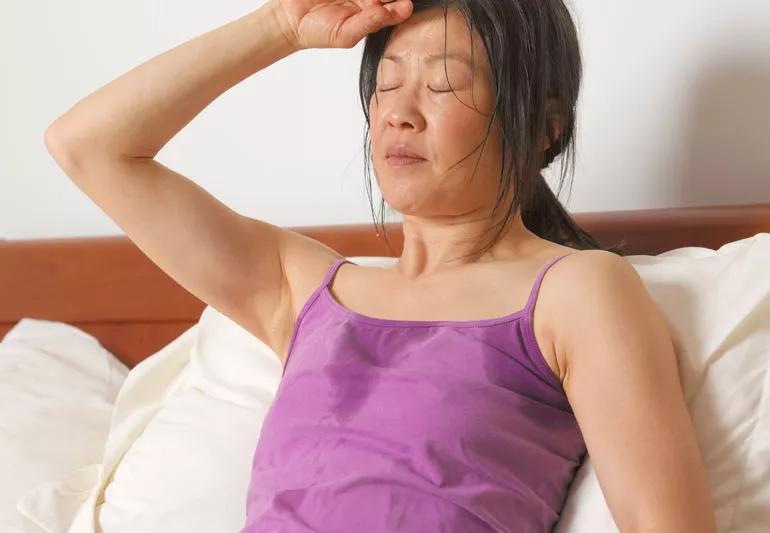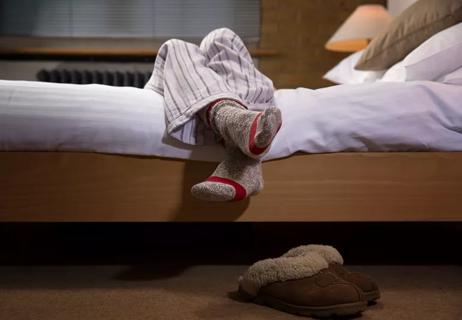The symptoms of menopause can disrupt your life

You may not have heard of the term “vasomotor symptoms.” But you’re probably familiar with its more common names: hot flashes and night sweats.
Advertisement
Cleveland Clinic is a non-profit academic medical center. Advertising on our site helps support our mission. We do not endorse non-Cleveland Clinic products or services. Policy
Around the age of 40, women experience decreased levels of estrogen and progesterone. This triggers the start of perimenopause, the transitional period before menopause.
It’s not known what exactly causes hot flashes. It’s believed those hormonal variations affect your brain’s temperature center, which can lead to your body’s reactions to changes in that internal temperature.
And that can make you break out in sweat during the day and wake up drenched in sweat during the night.
So, should you be concerned?
Internal medicine and women’s health specialist Andrea Sikon, MD, explains what’s normal when it comes to hot flashes and night sweats and when you should see your doctor.
Hot flashes are a common symptom of menopause and they can be very uncomfortable. When they happen at night, they’re called night sweats.
“Hot flashes have been described by many as a sudden onset of intense heat in the trunk area,” says Dr. Sikon. “Then, it spreads up, followed by a sweat and sometimes the sense of being cold afterward.”
Some individuals may not experience hot flashes. But for those who do, the severity and length of time of each hot flash can vary from person to person.
“Hot flashes can be very intense and very disruptive. Some individuals can have beads of sweat or sweat dripping down on their clothes,” explains Dr. Sikon. “Night sweats can also be very disruptive. They can wake you up and cause you to need to change your night clothes or sheets.”
Advertisement
Hot flashes, night sweats and other vasomotor symptoms can last for about four to seven years.
“Most individuals will experience hot flashes and oftentimes they’re mild to moderate,” says Dr. Sikon. “But then, there are some who have severe symptoms and those that have them for decades.”
Hot flashes and night sweats related to menopause aren’t dangerous.
But bad for your health? Possibly.
If night sweats are keeping you up during the night, that can lead to a whole host of other symptoms like fatigue and tiredness.
“We need sleep,” says Dr. Sikon. “And we need good quality sleep.”
According to the Centers for Disease Control and Prevention (CDC), most adults need between seven and nine hours of sleep a day.
Research shows that disrupted sleep can impact your weight, cardiovascular health and your mood.
“If you’re not sleeping, your mood is affected,” says Dr. Sikon. “You’re more irritable, you have a harder time concentrating and you might be more likely to fall asleep throughout the day.”
Not directly, says Dr. Sikon.
“Hot flashes, in and of themselves, aren’t harmful for you,” says Dr. Sikon.
But if you notice that you’re only getting hot flashes when you exert yourself (exercising, doing housework, etc.) and it’s accompanied by other symptoms like chest heaviness or tightness or shortness of breath, then it may be time to see your doctor right away. It may be another condition unrelated to menopause.
While there had been concerns about hormone therapy causing an increased risk of cardiovascular disease, research shows that estrogen can be beneficial if hormone therapy is started sooner rather than later. Many individuals are great candidates for hormone therapy and can talk through the risks, as well as the benefits, with a knowledgeable provider who knows the research.
But if you wait 10 years after menopause to start hormone therapy, the risks of cardiovascular disease increase, outweighing the benefits.
“After an individual goes without estrogen for a decade and then if they were to get estrogen later, it could increase risks,” notes Dr. Sikon. “Many also worry about an increased risk of breast cancer with hormonal therapy. They don’t realize that it’s only a rare side effect of estrogen-progestin therapy used in the treatment of those who have a uterus. There’s no increased risk in those who had a hysterectomy and are on estrogen alone.”
Whether you’re having hot flashes multiple times a day, are embarrassed by the excessive sweat or are having trouble getting a good night’s sleep due to night sweats, it’s important to know you’re not alone.
An estimated 75% of individuals who go through menopause experience hot flashes.
Advertisement
And if your hot flashes interfere with your life, don’t hesitate to see your doctor.
Make sure you choose a doctor who has experience with treating hot flashes, whether that’s your primary care doctor, an Ob/Gyn or a specialist.
Your doctor will start out by asking about your symptoms. Some questions they may ask include:
Your doctor may provide you with information on lifestyle changes you can make to help with hot flashes like wearing layers, dressing in breathable fabrics and taking note of your triggers (for example spicy food, stress, heat or alcohol).
There are treatment options available, including hormone therapy, nonhormonal prescription medication and alternative therapies.
And if your doctor recommends hormone therapy or prescription medication, make sure you discuss the pros and cons with them.
“Hot flashes are a normal part of life,” says Dr. Sikon. “They can be intense and disruptive. Most people don’t want to talk about menopause, they’re embarrassed about it. But hot flashes can be managed and don’t have to disrupt your life.”
Advertisement

Sign up for our Health Essentials emails for expert guidance on nutrition, fitness, sleep, skin care and more.
Learn more about our editorial process.
Advertisement

Estrogen loss contributes to bone loss, which significantly raises your risk of osteopenia and osteoporosis

Making certain changes to your diet, sleep habits and even your wardrobe may help lessen the impact of menopause symptoms

A women’s health specialist explains those cold flashes that come on quickly

Changing hormone levels can bring issues like brittle nails, indigestion, dry skin and new allergies (to name a few!)

The choices you make at mealtime could reduce hot flashes or make them worse

If you’ve noticed changes in your mood and mental health while going through menopause, you’re not alone

Missed periods, heavy periods, painful sex and frequent hot flashes are just a few symptoms worth discussing with your provider

At-home tests measure FSH levels in urine, but they can’t actually diagnose menopause

Even small moments of time outdoors can help reduce stress, boost mood and restore a sense of calm

A correct prescription helps your eyes see clearly — but as natural changes occur, you may need stronger or different eyeglasses

Both are medical emergencies, but they are very distinct events with different causes